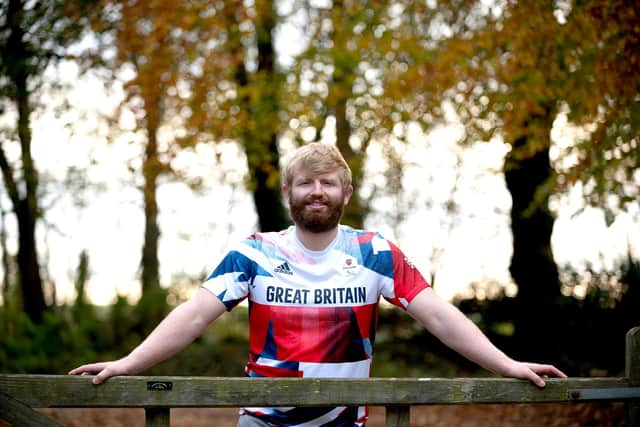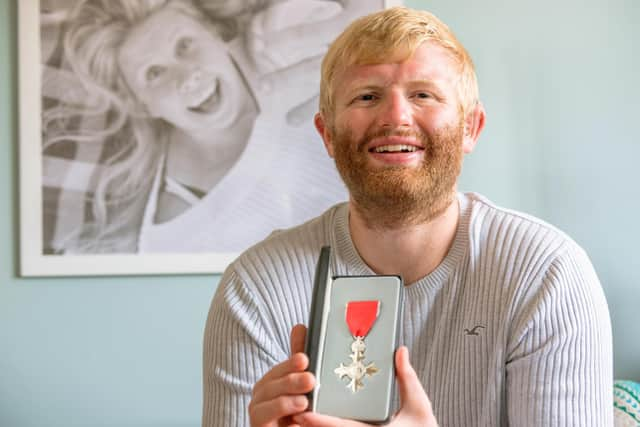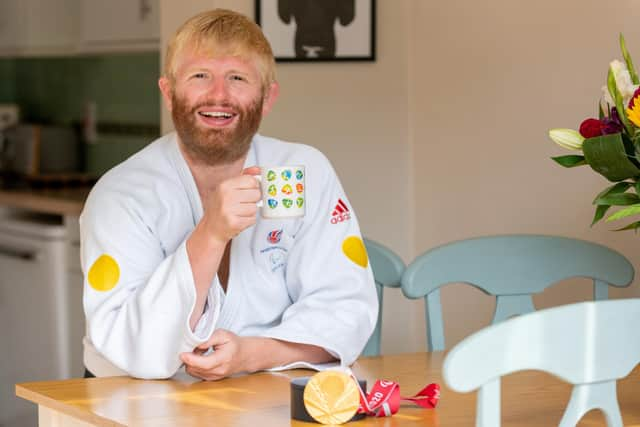Paris Paralympic dream is alive for Chris Hunt Skelley thanks to learning to ask for help
He’s currently ranked number two in the world in his category (-100kg).
“So I’m working hard to stay in that position, and try and hit number one and make sure I’m in a very good position to hopefully qualify for Paris,” he adds.
Advertisement
Hide AdAdvertisement
Hide Ad“It’ll be a dream come true because I never expected to be even in the Paralympics. To do it three times will be really special.”


Just five years old when his parents first took him to a local judo club in Hull, Skelley soon fell in love with the sport. But its role in his life took on an even deeper meaning in his teens, after he began losing his sight due to the genetic condition oculocutaneous albinism.
“That was the biggest dark period of my life, because everything I’d built up for myself got whisked away from me. And there is no manual [for living with sight loss], there’s no-one there to go, ‘this is how you should do it’,” recalls Skelley, who had to let go of his plans to become a mechanic and give up rugby, his other big passion.
“It’s through learning and making mistakes, and learning from those mistakes, that you learn how to live a bit better.”
Advertisement
Hide AdAdvertisement
Hide AdHe did have some “amazing people” around him though, whose support helped him through it. And, of course, his judo – something Skelley was not only able to continue doing, but excelled at.


So, does preparing for the Paralympic Games feel any different third time around?
“You become a lot more calm with it,” reflects Skelley, now 30, who is currently splitting his time between Swindon, where he lives with his wife Louise Hunt Skelley, and the British Judo National Training Centre in Walsall. “I’m taking each competition as they come, and making sure I’ve prepared the best I can. But I’m relaxed and not overthinking anything.”
Since the last Games, he’s celebrated a personal win – marrying Louise in 2022 (they combined their two surnames). They met at the Rio 2016 Paralympics; Louise, who was born with spina bifida, was a wheelchair tennis competitor.
Advertisement
Hide AdAdvertisement
Hide Ad“I always say she was my platinum medal,” Skelley says happily. “Because we met in Rio, and sadly that was my first time that I didn’t medal, but I came away with something better than that – the love of my life.


“We’re about a year and a half into our marriage now and we’re loving every moment,” he continues. “And she gets it as well, she gets the commitment and hard choices you have to make as an athlete for the Paralympic Games, because she’s a two-time Paralympicer herself. So she understands the tough choices, like missing parties, missing birthdays, because you are chasing that one dream, and she’s really supportive of what I’m doing.
“If I don’t want to train, or I’m overtraining, she’s the first one to either tell me to train harder or to take a chill pill and relax. It’s very nice to have that person in your life who gets it and is there to support you all the way. She’s my biggest sounding board and will challenge and support me. I’m very, very lucky to have someone like that in my life.”
The couple are on the same page when it comes to enjoying their downtime together too, weaving plenty of joy and relaxation into day-to-day life.
Advertisement
Hide AdAdvertisement
Hide Ad“We’ve got a wonderful little dog Milo, he’s our little baby. We’ve not got human babies yet – we’ve got a dog baby who is our world, and we love going out for walks with him, seeing lots of family and friends,” Skelley says.
“We also love to do spa days, because we both like to just chill out together, and we love going to see musicals.
“We’re just trying to spend as much time together as possible really, because you never know what’s around the corner. We have a lot of fun and a lot of adventures.”
These days, Skelley also puts a lot of energy into mentoring and speaking, using his own experiences and lessons he’s learned to help others. So, what are some of the main things he’s discovered?
Advertisement
Hide AdAdvertisement
Hide Ad“For me, when you’re in that dark period of your life, it’s to trust the people behind you, and to know that people are there for you. Because sometimes when you’re in that dark period, you feel very alone. I had an amazing mum, and judo, those were my two biggest things that got me through that period. And then when I went through some more dark periods, it was my wife.
“It’s important to reach out and ask for help – don’t be afraid to ask for help,” he continues. “Just putting your hand up and going, ‘I need help’.”
He admits this can be hard though, and he struggled with it initially.
“I don’t want people think it was a quick fix [for me],” says Skelley, adding: “And having something in your life that will give you purpose is really important. But again, it took me ages to find it – and it’s still not finished, I’m not a finished article. I’m constantly learning, and making mistakes and growing, and things will change.
Advertisement
Hide AdAdvertisement
Hide Ad“Life is a revolving door, so it will always come at you. You’ve got to be able to adapt.”
Having a love of sport is about far more than career goals and winning medals too. It’s at the core of his personal wellbeing.
“After I get off the phone now, I’m going to do a little conditioning session, just to give me a bit of a boost for today,” he says. “I love training – if I haven’t trained for a few days, I get itchy feet, because I need it.
“It’s really important to have that thing that gives you that buzz. For me, it’s training, but it doesn’t have to be sport, it could be anything. It could be playing an instrument, it could be cooking, it could be learning maths, history, facts – anything.”
Advertisement
Hide AdAdvertisement
Hide AdFor anyone facing their own dark period, looking for purpose or adapting to life with disability, this would be his advice: “Look at your life, ask what gives you that buzz, and go and explore it, have fun with it,” says Skelley. “The human race is so adaptable, so don’t be afraid to go and explore and enjoy life as much as you can.”